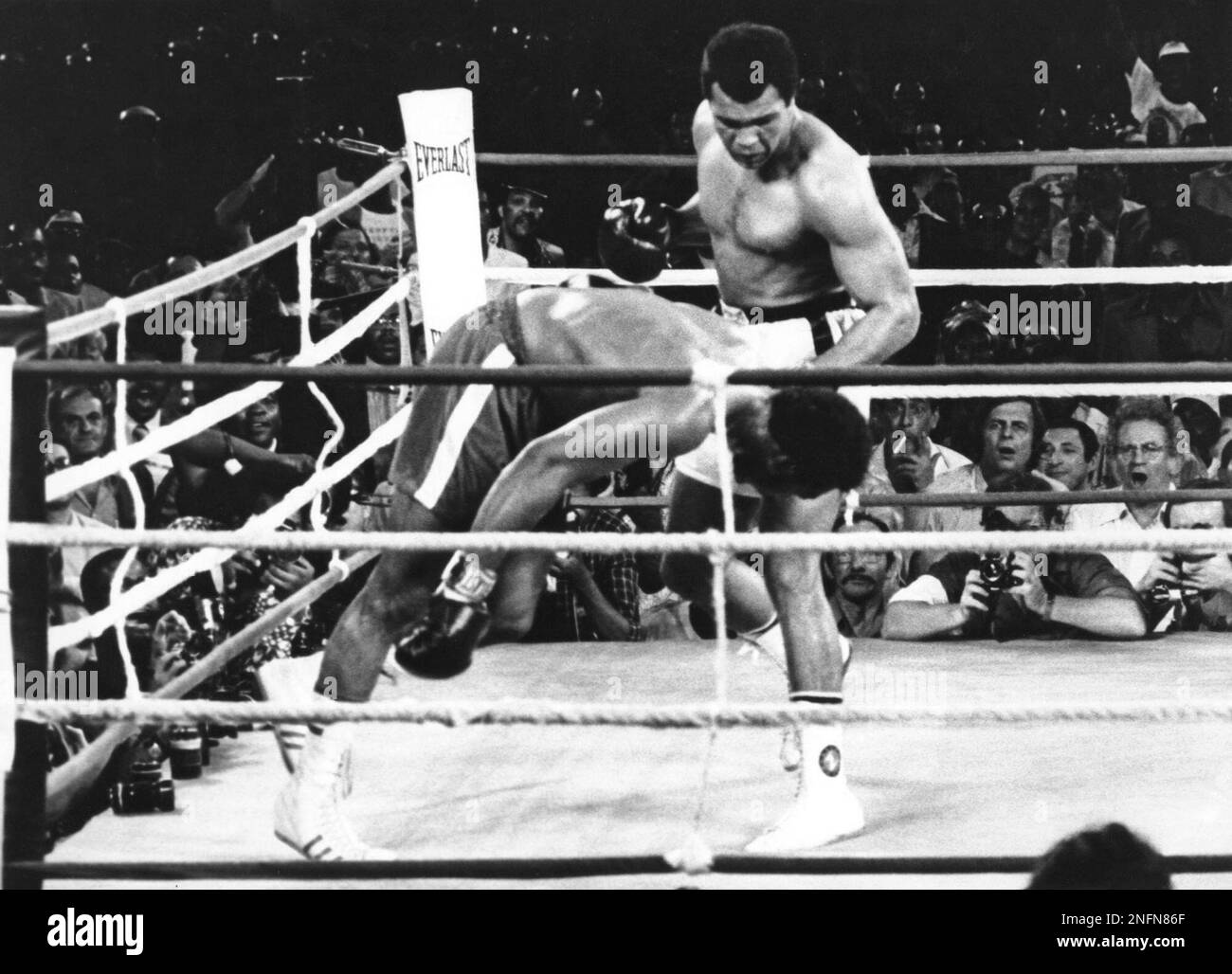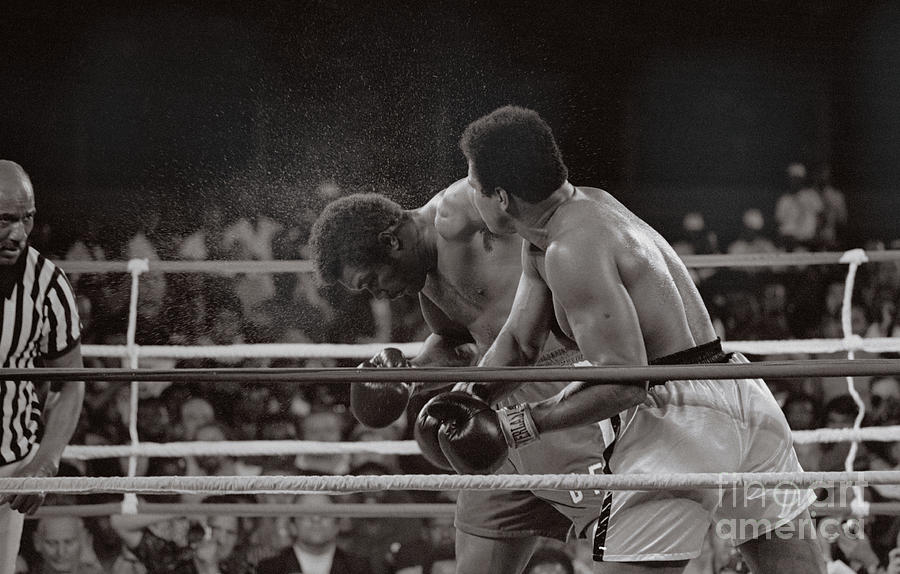The Rumble In The Jungle: Ali Vs. Foreman - A Historic Fight!
Can a single boxing match transcend the sport itself, becoming a cultural touchstone that resonates across continents and generations? On October 30, 1974, in the heart of Kinshasa, Zaire, a fight billed as "The Rumble in the Jungle" not only delivered an unforgettable sporting spectacle, but also etched itself into the annals of history.
The air crackled with anticipation. The Stade du 20 Mai, capable of holding upwards of 60,000 spectators, buzzed with an energy that was palpable, a mixture of excitement and raw expectation. This was no ordinary boxing match; it was a clash of titans, a cultural collision, and a statement of defiance. The undefeated and undisputed heavyweight champion of the world, George Foreman, stood across the ring from the legendary Muhammad Ali, a former champion seeking to reclaim his throne.
The event was more than just a boxing match. At the time, Zaire was ruled by Mobutu Sese Seko, a dictator who astutely recognized the potential of this international event to bolster his country's global image and foster a sense of national pride. The "Rumble in the Jungle" provided a platform for Zaire to assert itself on the world stage, transforming the nation into a focal point of global attention.
The world watched, not just the boxing world, but the entire globe, with estimates of television viewership reaching an astounding one billion. The stakes were high, not just for the fighters, but for the legacy of boxing and the perception of Africa on the global stage. The fight itself was a masterclass in strategy, resilience, and sheer determination, with Ali employing a strategy later dubbed rope-a-dope. He let Foreman unleash his power, absorbing the blows and tiring the champion until, in the eighth round, Ali seized his opportunity. A flurry of punches sent Foreman to the canvas, marking a seismic shift in the boxing world.
| Attribute | Muhammad Ali |
|---|---|
| Full Name | Cassius Marcellus Clay Jr. (Later changed to Muhammad Ali) |
| Nickname(s) | "The Greatest," "The Louisville Lip" |
| Born | January 17, 1942, Louisville, Kentucky, USA |
| Died | June 3, 2016, Scottsdale, Arizona, USA |
| Nationality | American |
| Stance | Orthodox |
| Height | 6 ft 3 in (191 cm) |
| Reach | 78 in (198 cm) |
| Total Fights | 61 |
| Wins | 56 |
| Wins by KO | 37 |
| Losses | 5 |
| Draws | 0 |
| Professional Boxing Record | 56-5-0 |
| Major Titles | World Heavyweight Champion (3 times) |
| Other Notable Achievements | Olympic Gold Medalist (1960), Recognized for his social activism and humanitarian work. |
| Key Boxing Style Aspects | Exceptional hand speed, footwork, and ring generalship. Known for his "rope-a-dope" strategy and ability to absorb punishment while wearing his opponent down. |
| Legacy | One of the most influential figures in boxing history and a global icon. Remembered not only for his fighting skills but also for his outspoken nature and commitment to social justice. |
| Reference | Wikipedia - Muhammad Ali |
The events impact rippled far beyond the confines of the ring. For Ali, it was a triumphant return to the pinnacle of the sport, a testament to his unwavering spirit and strategic brilliance. For Foreman, it was a crushing defeat, his first professional loss, shattering his seemingly impenetrable aura. But the "Rumble in the Jungle" was more than just a victory for Ali; it was a victory for the African continent, a moment of pride and empowerment for millions.
The fight took place on October 30, 1974. The location was the Stade du 20 Mai in Kinshasa, Zaire (now the Democratic Republic of Congo). The main event was between Muhammad Ali and George Foreman, a WBA/WBC heavyweight championship boxing match. The event was widely publicized and broadcast to a global audience, and attracted 60,000 spectators to the stadium.
Alis victory over Foreman was a turning point. It was a watershed moment not only for Ali, who regained his heavyweight title, but also for the sport of boxing itself. The fight was attended by 60,000 people and watched on television by as many as one billion, making it one of the most-watched sporting events in history. The legacy of the "Rumble in the Jungle" continues to resonate, inspiring athletes, artists, and activists alike.
The fight's cultural impact is undeniable. It transcended the boundaries of sport, becoming a symbol of African resilience and Black empowerment. The match was more than a sporting event; it was a cultural phenomenon. The event helped to elevate the status of the African continent on the world stage, highlighting its vibrancy, cultural richness, and the indomitable spirit of its people.
| Attribute | George Foreman |
|---|---|
| Full Name | George Edward Foreman |
| Nickname(s) | "Big George" |
| Born | January 10, 1949, Marshall, Texas, USA |
| Died | Living |
| Nationality | American |
| Stance | Orthodox |
| Height | 6 ft 3 in (192 cm) |
| Reach | 81 in (206 cm) |
| Total Fights | 81 |
| Wins | 76 |
| Wins by KO | 68 |
| Losses | 5 |
| Draws | 0 |
| Professional Boxing Record | 76-5-0 |
| Major Titles | World Heavyweight Champion (2 times) |
| Other Notable Achievements | Oldest Heavyweight Champion in history (at age 45) |
| Key Boxing Style Aspects | Powerful puncher with incredible knockout power. Relied on a strong defense and devastating uppercut and overhand right. |
| Legacy | Considered one of the hardest punchers in boxing history. Remembered for his comeback at an older age and his positive influence. |
| Reference | Wikipedia - George Foreman |
The event, dubbed "Rumble in the Jungle," quickly became more than just a boxing match; it was a cultural event that captivated the world. The fight served as a stage for broader issues, including racial identity, national pride, and the dynamics of power. It was a spectacle that had global reach and continues to resonate decades later.
It was a fight of epic proportions, a clash that had been heavily promoted and generated substantial global interest. It was a spectacle that brought attention not only to the sport of boxing but also to the African continent, which was largely ignored by the West. The fight was a major turning point in the careers of both men, particularly Ali. The event was a defining moment in both sports and cultural history.
The "Rumble in the Jungle" also provided the world with a compelling narrative. The underdog Ali, stripped of his title years earlier due to his refusal to serve in the Vietnam War, fighting against the seemingly unstoppable Foreman. The location also played a significant role in the story, as the fight took place in Kinshasa, Zaire (now the Democratic Republic of the Congo), offering a platform for the African continent to showcase its culture and strength.
The event was a turning point. On October 30, 1974, in Kinshasa, Zaire, Muhammad Ali, against all odds, knocked out George Foreman. In doing so, he reclaimed the world heavyweight championship. The fight was not just a sporting event; it was a cultural phenomenon that continues to resonate decades later. The "Rumble in the Jungle" remains a reminder of the power of sport to inspire, unite, and leave an indelible mark on the world.


